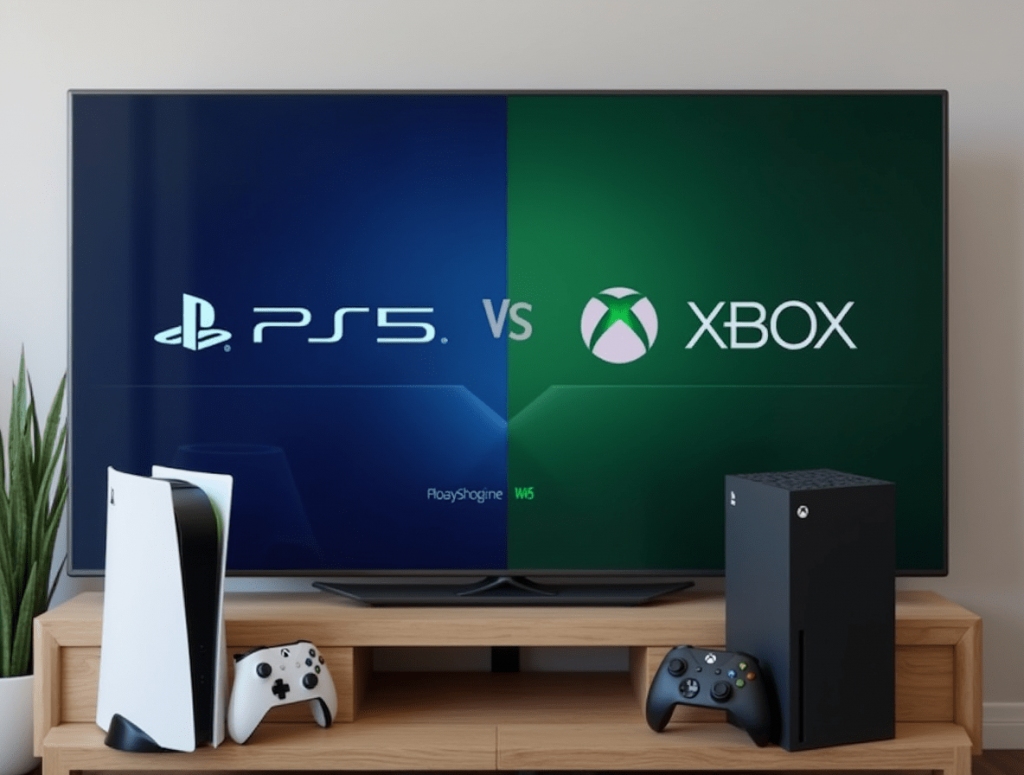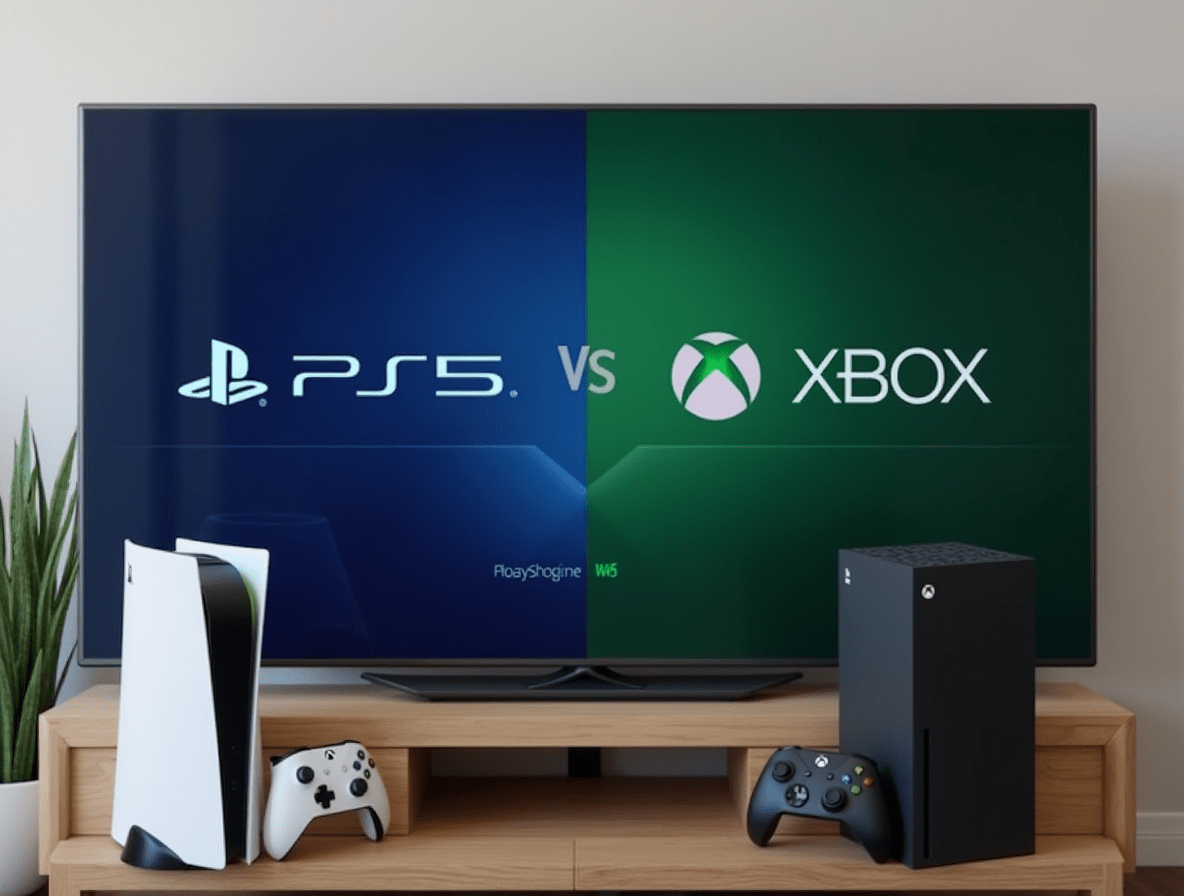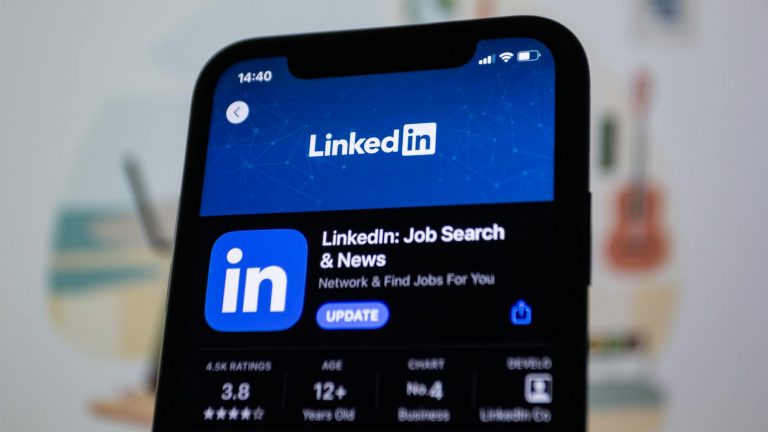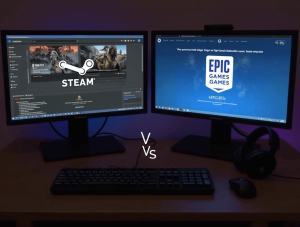
The eternal question among gamers: PlayStation or Xbox? With the latest generation of consoles now well-established in the market—the PlayStation 5 and Xbox Series X|S—this rivalry continues to define the gaming landscape in 2025. Yet the answer to which console reigns supreme isn’t straightforward, as each platform offers distinct advantages that might appeal differently depending on your gaming preferences and priorities.
Recent data shows that while PlayStation maintains a global sales edge with over 65 million PS5 units sold compared to Xbox’s estimated 30 million Series X|S consoles, raw numbers don’t tell the complete story. Microsoft’s emphasis on Game Pass and cloud gaming has revolutionized how many players access content, creating value that transcends traditional hardware metrics.
In this comprehensive comparison, we’ll analyze both gaming ecosystems across crucial factors—from exclusive games and technical performance to ecosystem benefits and value propositions—helping you determine which console deserves your investment based on what matters most to your gaming experience.
Console Hardware: Power and Performance
PlayStation 5 Hardware Overview
The PlayStation 5 comes in two physical variants: the standard edition with a disc drive and the Digital Edition without one. Both feature identical internal hardware:
- CPU: Custom AMD Zen 2, 8-core at 3.5GHz
- GPU: Custom RDNA 2, 10.28 teraflops
- RAM: 16GB GDDR6
- Storage: Custom 825GB SSD with 5.5GB/s raw throughput
- Expandable Storage: NVMe SSD slot
- Resolution Support: Up to 8K
- Frame Rate: Up to 120fps
- Special Features: DualSense controller with haptic feedback and adaptive triggers
The PS5’s standout hardware innovation is its high-speed SSD, which virtually eliminates loading times and enables new game design possibilities not previously feasible on console hardware.
Xbox Series X|S Hardware Overview
Microsoft offers two distinct console options with different performance targets:
Xbox Series X:
- CPU: Custom AMD Zen 2, 8-core at 3.8GHz
- GPU: Custom RDNA 2, 12.15 teraflops
- RAM: 16GB GDDR6
- Storage: 1TB Custom NVMe SSD
- Expandable Storage: Proprietary expansion card
- Resolution Support: Up to 8K
- Frame Rate: Up to 120fps
Xbox Series S:
- CPU: Custom AMD Zen 2, 8-core at 3.6GHz
- GPU: Custom RDNA 2, 4 teraflops
- RAM: 10GB GDDR6
- Storage: 512GB Custom NVMe SSD
- Expandable Storage: Proprietary expansion card
- Resolution Target: 1440p (upscaled to 4K)
- Frame Rate: Up to 120fps
The Series X theoretically edges out the PS5 in raw GPU performance, while the Series S offers a more affordable entry point to next-generation gaming with some performance compromises.
Performance Comparison in Real-World Gaming
Despite specification differences, real-world performance between the PS5 and Xbox Series X is remarkably similar. Digital Foundry analysis across multiple third-party titles shows:
- Most cross-platform games run at comparable resolutions and frame rates
- Some titles perform slightly better on Series X, others on PS5
- Differences are typically minor and often imperceptible during normal gameplay
- Both consoles support ray tracing, though implementation varies by game
The most noticeable hardware difference in daily use comes from:
- The PS5’s faster SSD, which can load games several seconds quicker in some cases
- The DualSense controller’s haptic feedback, which adds a dimension of immersion absent on Xbox
- The Xbox Series X’s slightly more consistent performance in backward compatibility for older titles
Exclusive Games: The Deciding Factor
PlayStation Exclusives
PlayStation’s first-party studios have consistently delivered critically acclaimed exclusive experiences, with standout titles including:
- God of War Ragnarök – The continuation of Kratos and Atreus’s Norse saga
- Horizon Forbidden West – Aloy’s expansive post-apocalyptic adventure
- Marvel’s Spider-Man 2 – The web-slinging sequel featuring both Peter Parker and Miles Morales
- Final Fantasy VII Rebirth – The second chapter in Square Enix’s reimagining
- Ratchet & Clank: Rift Apart – A technically impressive platformer showcasing the PS5’s capabilities
- Ghost of Tsushima – The samurai epic from Sucker Punch
- Returnal – Housemarque’s challenging roguelike shooter
- Gran Turismo 7 – PlayStation’s flagship racing simulator
PlayStation exclusives typically focus on narrative-driven single-player experiences with high production values and cinematic presentations.
Xbox Exclusives
Microsoft has dramatically expanded its first-party portfolio through studio acquisitions, delivering titles like:
- Starfield – Bethesda’s massive space RPG
- Halo Infinite – The latest entry in Xbox’s signature franchise
- Forza Horizon 5 – The acclaimed open-world racing series
- Microsoft Flight Simulator – The stunningly realistic flight sim
- Fable – The reboot of the beloved RPG series
- Perfect Dark – A reimagining of the classic shooter
- Avowed – Obsidian’s first-person fantasy RPG
- The Elder Scrolls VI – The highly anticipated next chapter in the legendary series
Xbox Game Studios titles generally offer more open-ended gameplay with emphasis on player freedom and replayability.
PlayStation vs. Xbox: Genre Strengths
Each platform demonstrates particular strengths in different game genres:
PlayStation excels in:
- Action-adventure narratives
- Japanese RPGs and games
- Cinematic single-player experiences
- VR gaming through PlayStation VR2
Xbox dominates in:
- Western RPGs
- Racing simulations
- First-person shooters
- Simulation games
For many gamers, exclusive titles remain the primary decision factor when choosing between platforms.
Value and Subscriptions: The Ecosystem Battle
PlayStation Plus Tiers
PlayStation’s subscription service offers three tiers:
PlayStation Plus Essential ($9.99/month):
- Online multiplayer access
- 2-3 monthly downloadable games
- Cloud saves
- Exclusive discounts
PlayStation Plus Extra ($14.99/month):
- Everything in Essential
- Access to catalog of 400+ PS4/PS5 games to download
PlayStation Plus Premium ($17.99/month):
- Everything in Extra
- Classic games catalog
- Game trials
- Cloud streaming
Xbox Game Pass
Xbox’s subscription approach centers on its Game Pass service:
Xbox Game Pass Console ($11.99/month):
- Access to 100+ games on console
- Day one access to all Xbox Game Studios titles
- EA Play membership
- Exclusive member discounts
Xbox Game Pass PC ($11.99/month):
- Access to 100+ games on PC
- Day one access to all Xbox Game Studios titles
- EA Play membership
Xbox Game Pass Ultimate ($18.99/month):
- Everything in Console and PC
- Xbox Cloud Gaming
- Xbox Live Gold (online multiplayer access)
- Additional perks and exclusive deals
The Value Proposition
Microsoft’s Game Pass has revolutionized value in gaming, offering day-one access to first-party titles as part of the subscription. This means players can experience major releases like Starfield or the next Halo without additional purchase.
PlayStation’s approach emphasizes premium standalone game sales with PlayStation Plus serving as a supplementary benefit. While PS Plus Extra and Premium offer access to a substantial back catalog, new first-party releases typically aren’t added until months or years after launch.
For cost-conscious gamers who enjoy exploring a variety of titles, Xbox Game Pass represents unprecedented value. For players who focus on a few premium experiences each year, PlayStation’s model may be more appropriate.
Additional Features and Ecosystem Factors
Backward Compatibility
Xbox:
- Comprehensive compatibility with Xbox One games
- Substantial library of Xbox 360 and original Xbox titles
- Many older games receive automatic enhancements
- Smart Delivery ensures you get the right version for your console
PlayStation:
- Nearly complete PS4 library compatibility
- Limited PS3 game streaming (Premium tier only)
- Very select PS1, PS2 classics available
- No native PS3 compatibility due to architecture differences
Xbox holds a clear advantage in preserving gaming history and maintaining access to older titles.
Cloud Gaming Integration
Xbox Cloud Gaming:
- Stream games to mobile devices, browsers, and Smart TVs
- Included with Game Pass Ultimate
- Growing library of cloud-enabled titles
- Cross-progression between devices
PlayStation Cloud:
- Available through PlayStation Plus Premium
- Limited to supported PS3, PS4, and PS5 titles
- Required for playing classic PlayStation titles
- Gradually expanding device support
Xbox’s cloud strategy is more developed and central to its long-term vision, while PlayStation’s approach remains more supplemental to its traditional console business.
User Interface and Quality of Life
PlayStation 5:
- Clean, visual-focused interface
- Activity cards provide quick access to game objectives
- Highly customizable control center
- Generally snappy performance, occasional hitching
Xbox Series X|S:
- Consistent, unified dashboard experience
- Quick Resume allows jumping between multiple suspended games
- More customization options
- Slightly more complex but more feature-rich
Both interfaces have strengths, with PlayStation focusing on visual immersion and Xbox prioritizing functionality and multitasking.
Making Your Decision: Which Console is Right for You?
Choose PlayStation 5 If:
- You prioritize narrative-driven exclusive games
- You’re interested in PlayStation VR2
- You value the DualSense controller’s innovative features
- You prefer Japanese-developed games and JRPGs
- You want the fastest possible loading times
Choose Xbox Series X If:
- You value Game Pass and its extensive library
- You play many games rather than focusing on a few titles
- Backward compatibility across multiple generations matters to you
- You prefer Western RPGs and shooters
- You want the most powerful console hardware available
Choose Xbox Series S If:
- You’re looking for the most affordable entry point to current-gen gaming
- You primarily play digital games rather than physical discs
- Game Pass is your primary way to access games
- You don’t have a 4K display or don’t prioritize maximum resolution
- Space is limited in your entertainment setup
Conclusion: No Wrong Choice
The PlayStation vs. Xbox debate ultimately comes down to personal preferences and priorities. PlayStation continues to excel with premium exclusive experiences and innovative hardware features, while Xbox offers unmatched value through Game Pass and stronger backward compatibility.
Many dedicated gamers eventually own both systems to enjoy the best of both worlds, but if you must choose one, consider:
- Which exclusive games appeal to you most
- Whether subscription value or premium experiences are your priority
- If specific features like Quick Resume or the DualSense controller would enhance your favorite genres
- Whether your friends play predominantly on one platform
Both PlayStation and Xbox offer exceptional gaming experiences with their latest hardware. The “better” console is the one that aligns with your specific gaming preferences and needs.
FAQ Section
Can I play with friends who own the other console?
Cross-platform play is increasingly common but not universal. Popular titles like Fortnite, Call of Duty, Minecraft, and Rocket League support cross-play between PlayStation and Xbox, but many games still maintain separate player pools.
Which console is better for families and younger gamers?
Both platforms offer robust parental controls and family-friendly titles. Xbox Game Pass provides more immediate value for families with its large library of accessible games, while PlayStation has strong exclusive titles appropriate for younger players like Ratchet & Clank and Sackboy.
Do I need a 4K TV to benefit from these consoles?
No, both PlayStation 5 and Xbox Series consoles provide benefits on standard HD displays, including higher frame rates, faster loading, and enhanced visual effects. However, to experience the full visual capability, a 4K display is recommended.
What about digital vs. disc-based consoles?
The PS5 Digital Edition and Xbox Series S lack disc drives, meaning all games must be purchased digitally. Consider this carefully if you have existing physical games, like to buy used games, or value your console as a Blu-ray player.
How do the controllers compare?
The PlayStation DualSense features advanced haptic feedback and adaptive triggers that provide unique tactile experiences. The Xbox controller refines an already excellent design with better ergonomics and cross-device compatibility. Controller preference is highly subjective.
Which console takes up less space?
The Xbox Series S is significantly smaller than both the PS5 and Xbox Series X. The PS5 is the largest of the current generation consoles, which might be a consideration for limited entertainment spaces.














